Farmers facing thousands in costs as February sees record rain and temperatures
Last month was the warmest February on record for England and Wales, as well as the wettest on record for southern England, the Met Office said.

British farmers are facing thousands in costs as areas of England saw record levels of rain and warm temperatures for February.
Last month was the warmest February on record for England and Wales, as well as the wettest on record for southern England, according to provisional figures from the Met Office.
Andrew Blenkiron, a farmer and director at Euston Estate in Suffolk, said the conditions have been “frustrating and costly” for sowing and harvesting crops this year.
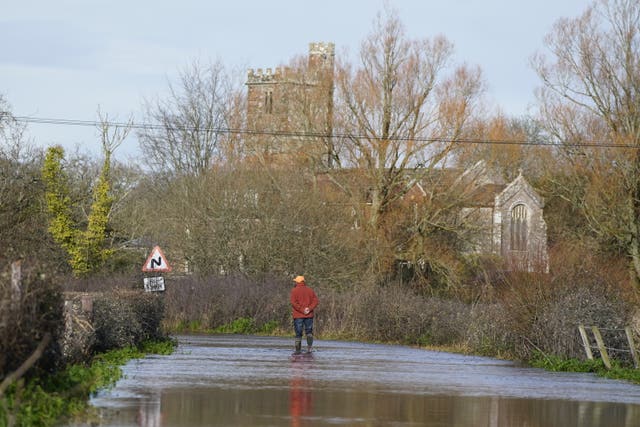
He told the PA news agency that the wet conditions affected the sowing of autumn crops as well as the harvesting of sugar beet over winter and left a river-side area where sheep usually graze flooded for most of the season.
Speaking about the weather in February, he told the PA news agency: “We can’t get on and get any land work done now so we are struggling to prepare land for the planting of spring crops.
“We’re probably a month behind where we would like to be and that’s starting to be very frustrating.
“There will be a financial impact on not being able to get those Autumn crops planted and the delay now is potentially going to impact on yields as we move forwards in the summer.”
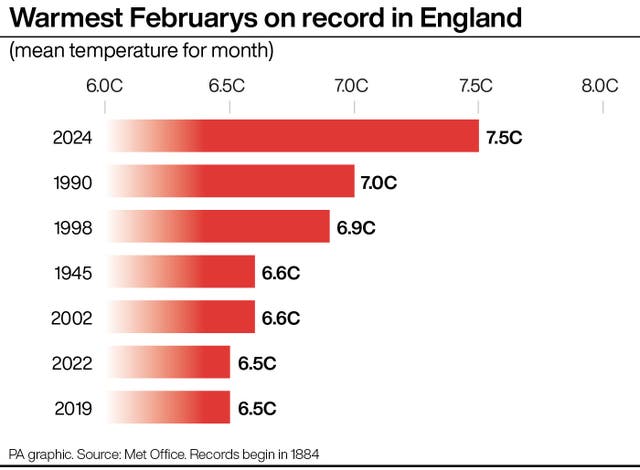
Meanwhile, Glenn Buckingham, a farm manager on the Helmingham Estate in Suffolk and county chair for the National Farmers Union, spoke about how the conditions have affected farmers across the South East.
While no two farms are the same and some are in a better position, Mr Buckingham said the conditions can easily lead to a cost of several thousand pounds.
At his farm, he said they had to resow about 20% of their winter wheat, adding: “The delay in what we have we have resown amounts to a cost and potentially a yield.
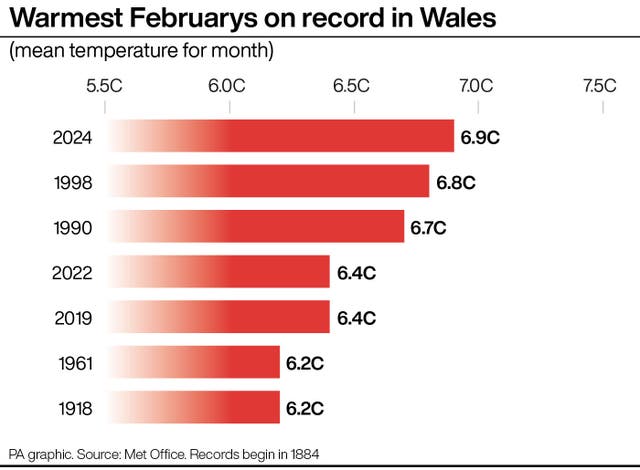
“We’ve spent a few more days in the fields in difficult conditions – and we have got there, we’ve got the crops away and it costs a bit more seed – so a few thousand pounds. It’s very easy for it to be several thousand pounds.”
Mr Buckingham added that the conditions could also cause a loss in the position they would have been in for a decent harvest in 2024.
The Met Office said the south of England had its wettest February in a time series going back to 1836, with many parts of the region recording well over twice the average rainfall for the month.
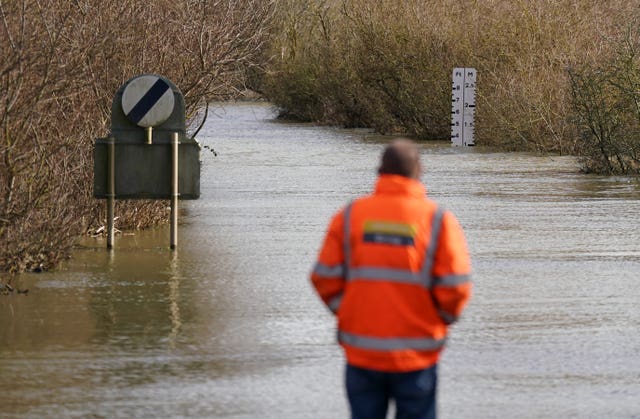
Meanwhile, East Anglia has experienced both its warmest and wettest February on record, with an average of 106.4mm of rainfall across the month, beating the previous record of 95.2mm set in 1916, and a mean temperature of 8.2C, surpassing the previous record of 7.6C set in 1990.
The UK as a whole experienced its second warmest February, with a mean temperature across the month of 6.3C, behind the record of 6.8C set in 1998.
Mike Kendon, of the Met Office, said: “The UK’s observations clearly show winters are getting warmer, and they are also getting wetter since as the atmosphere heats up, it has an increased capacity to hold moisture.
“The top 10 warmest winters on record for the UK include 2024, 2022, 2020, 2016 and 2014, and the top 10 wettest 2024, 2020, 2016 and 2014 – so very mild winters also show a tendency to be very wet.”
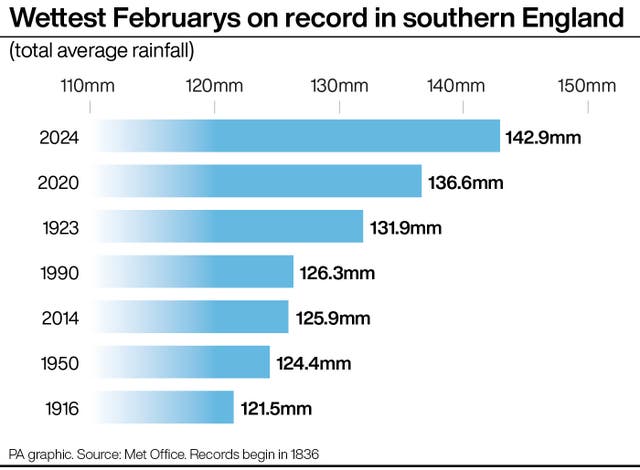
David Eudall, the economics and analysis director at the Agricultural and Horticulture Development Board, said cereal crop farmers are dealing with a “triple whammy” of rain preventing them from planting crops, the hangover from inflation, and lower prices on the international market.
“It is an extremely difficult year for them because the cumulative effect of all these things,” he said.
Mr Eudall said the UK is looking at around a 24% drop in areas being planted with crops this year, while crop size and quality will also likely be affected due to the roots “sitting in water, unable to grow and the increased risk of disease”.

He said: “It’s a 24% drop in areas being planted as a general number we are looking at,” he said, adding that this combined with the smaller plant size could lead to a nationwide production drop of around 4.5 million tonnes compared to an average year.
Speaking about the increasing unpredictability of conditions, Mr Blenkiron said farmers in the South East were facing droughts last year, adding: “This year, we have had 20 times the rain.
“Going from the driest year to the wettest year in the space of one year – that’s quite new,” he said.
“Farmers are on the frontline of facing that volatility now,” he added. “If you’re trying to earn your living from working in conjunction with nature and the weather, and it continues to suppress your efforts, it makes it incredibly frustrating.”
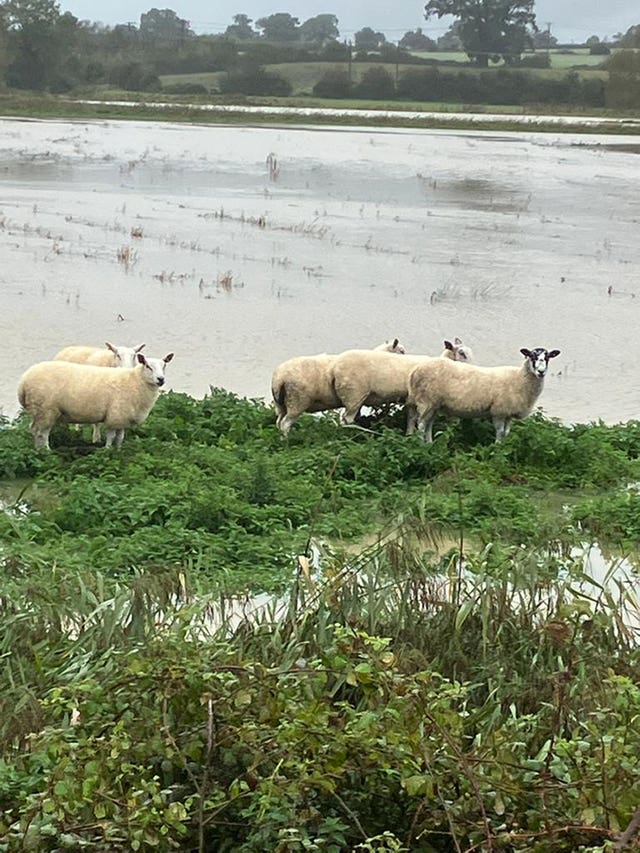
More widely, Mr Buckingham warned that the wet weather can cause soil loss from erosion while the warmer temperatures can affect disease levels.
“We had a bit of frost in January but February really should be colder,” he said.
“So what does this mean for disease levels or insect levels? Or the ones that might carry a virus? There are all sorts of implications.”
On the impact to costs for consumers, he said the system is currently resilient and flexible but that could change with the increasing impact from climate change.
“I don’t think a lot of people realise that potentially – we have a just-in-time service to everything – and we have to hope it doesn’t break in different places,” he said.
“And we could argue that the climate is now providing some of the breaks that might come along.”





